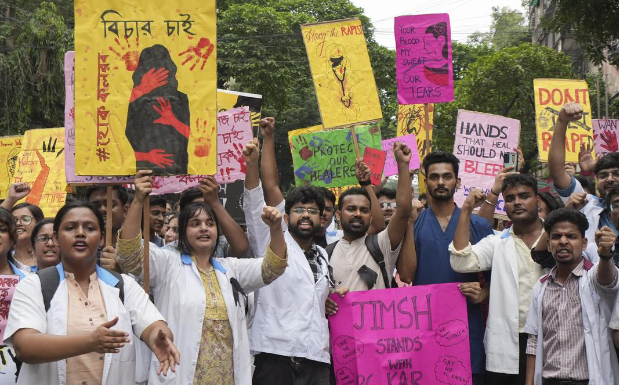Kolkata Doctor – Introduction
The shocking rape and murder of a young postgraduate trainee doctor at R G Kar Medical College and Hospital in Kolkata has triggered widespread national outrage, leading to intense protests and strikes by medical professionals across the country. As the investigation unfolds, significant concerns have emerged about the failures in institutional security and state machinery, sparking a debate on women’s safety and institutional accountability in India.
Nationwide Protests and Strikes
The horrific incident has galvanized the medical community into action, with doctors from various states and medical associations calling for protests and strikes. The Indian Medical Association (IMA) announced a 24-hour nationwide strike, during which non-emergency services were withdrawn, to condemn both the crime and the subsequent vandalism at the hospital by an enraged mob. This move was supported by numerous Resident Doctor Associations (RDA) across the country, who conducted protest marches to express their solidarity with the victim and demand justice.
In addition to the IMA’s strike, other organizations, including the Delhi Medical Association, also initiated strikes and protests. The Socialist Unity Centre of India (Communist) called for a 12-hour strike in West Bengal, reflecting the growing anger and frustration among the public and medical professionals alike.
Operational Failures and Institutional Lapses
The tragedy has exposed glaring operational failures within R G Kar Medical College and Hospital. Despite being one of Kolkata’s most prestigious medical institutions, the hospital failed to prevent an outsider, later identified as a civic volunteer with access to hospital premises, from committing such a heinous crime. The ease with which the suspect navigated the hospital without raising alarms has raised critical questions about the institution’s security protocols.
The subsequent vandalism at the hospital, which resulted in further chaos and destruction, has only added to the criticism of the state’s handling of the situation. The inability of the local police to protect the crime scene and maintain order at the hospital has been widely condemned. This failure was starkly highlighted when a group of protestors breached the hospital premises and caused significant damage, leading to multiple arrests.
Political and Judicial Reactions
The political fallout from this incident has been significant, with leaders across the political spectrum weighing in on the state government’s response. Union Minister Arjun Ram Meghwal criticized West Bengal Chief Minister Mamata Banerjee for what he termed as a lackluster response to the crisis. Similarly, BJP leader Suvendu Adhikari demanded that Central Armed Paramilitary Forces (CAPF) be deployed at the hospital to restore order, criticizing the local police for their incompetence.
On the judicial front, the Kolkata High Court has taken a keen interest in the case, with the former principal of R G Kar Medical College, who had resigned amid the controversy, claiming threats to his life and seeking protection from the court. The High Court’s involvement underscores the gravity of the situation and the broader implications for governance and law enforcement in the state.
Broader Implications
The rape and murder of the Kolkata doctor have sparked a broader conversation about women’s safety in public institutions, particularly in government-run hospitals. The incident has underscored the vulnerabilities that women face in their workplaces and has reignited calls for systemic reforms to ensure their safety. Women’s rights organizations have been vocal in their demands for stronger measures to protect women in all public spaces, not just hospitals.
This case has also highlighted the need for greater institutional accountability. Hospitals are expected to be safe spaces not just for patients but also for the staff who work there. The failure to ensure the safety of employees within the hospital premises is a breach of this trust and a significant failure of the institution’s responsibilities.
Conclusion
The tragic incident at R G Kar Medical College has become a national flashpoint, drawing attention to the systemic issues that plague public institutions in India. As the investigation continues, the focus remains on securing justice for the victim, addressing the operational failures that allowed such a crime to occur, and ensuring that measures are put in place to prevent such tragedies in the future. The protests and strikes are a powerful reminder that the medical community, along with the general public, demands accountability and action, not just rhetoric.





